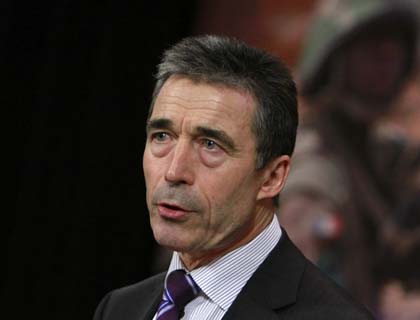KABUL - NATO won't be able to deploy its noncombat training and advisory mission in Afghanistan after next year unless President Hamid Karzai agrees to a Bilateral Security Agreement (BSA) with the U.S., NATO Secretary General Anders Fogh Rasmussen said on Monday.
Last month, Karzai rejected the Loya Jirga's recommendation to sign the BSA, which would ensure a continued military partnership between the U.S. and Afghanistan after the NATO combat mission ends in 2014, before the end of the year. He said he would not sign the pact before the April elections, and only then, if the U.S. met three preconditions: transparent elections in April, no raids on Afghan homes and a breakthrough in talks with the Taliban.
"Let me be very clear: It is a prerequisite for our presence in Afghanistan beyond 2014 that an appropriate legal framework is in place," Rasmussen told reporters at NATO headquarters after meeting with new Norwegian Prime Minister Erna Solberg. Without it, "it will not be possible to deploy a train, advice and assist mission to Afghanistan after 2014."
The U.S. has already warned it could withdraw all its forces by the end of next year, the so-called "zero option", if Karzai does not sign the pact.
Without the U.S.-Afghan accord, NATO will not be able to finalize its own agreement with the Afghan government setting the terms for troops from other NATO and partner nations to remain in Afghanistan after 2014, Rasmussen told reporters.
In exclusive interview with TOLOnews, Afghan Presidential spokesman Emal Faizi said that Rasmussen's comments were nothing new, and that officials in Kabul were well-aware that a continued NATO mission was contingent what happened with the U.S. deal.
"The remarks of the NATO secretary general with respect to the presence of NATO in Afghanistan aren't anything new, we discussed the matter with NATO officials in our previous meeting," Faizi said. "NATO will make the final decision with regard to its presence in Afghanistan after the BSA is signed."
On behalf of President Karzai, Faizi said that the government respects the Jirga and the BSA will be signed, but not until the preconditions of the Afghan government are addressed by Washington.
"We have not said that the agreement will not be signed," Faizi said. "The people of Afghanistan proved that they are willing to sign the agreement while keeping in mind their preconditions and these conditions have also been added in the Jirga resolution, and the BSA will be signed after the U.S. takes action on two topics."
Progress in peace negotiations with the Taliban and an end to all land and aerial attacks on homes of Afghans are the two preconditions now being enforced by Karzai, after he dropped a third demand related to the transparency of the April elections.
Meanwhile, the Taliban and Hezb-e-Islami have expressed satisfaction with Karzai's delay in signing the security pact. The Taliban had a press release saying Karzai has realized the truth.
The NATO Ministers' meeting is shaping up as an opportunity for alliance members to play up successes in Afghanistan in the face of continued instability there and low public support in the U.S. and Europe about the nearly 12-year NATO mission.
The NATO-led force currently has around 80,000 troops in Afghanistan, the majority American. NATO is winding down combat operations, handing responsibility to the Afghan security forces, before most foreign combat forces pull out by the end of 2014.
NATO plans to leave a training mission, expected to number 8,000 to 12,000 soldiers, in Afghanistan after 2014. (Tolo News)

